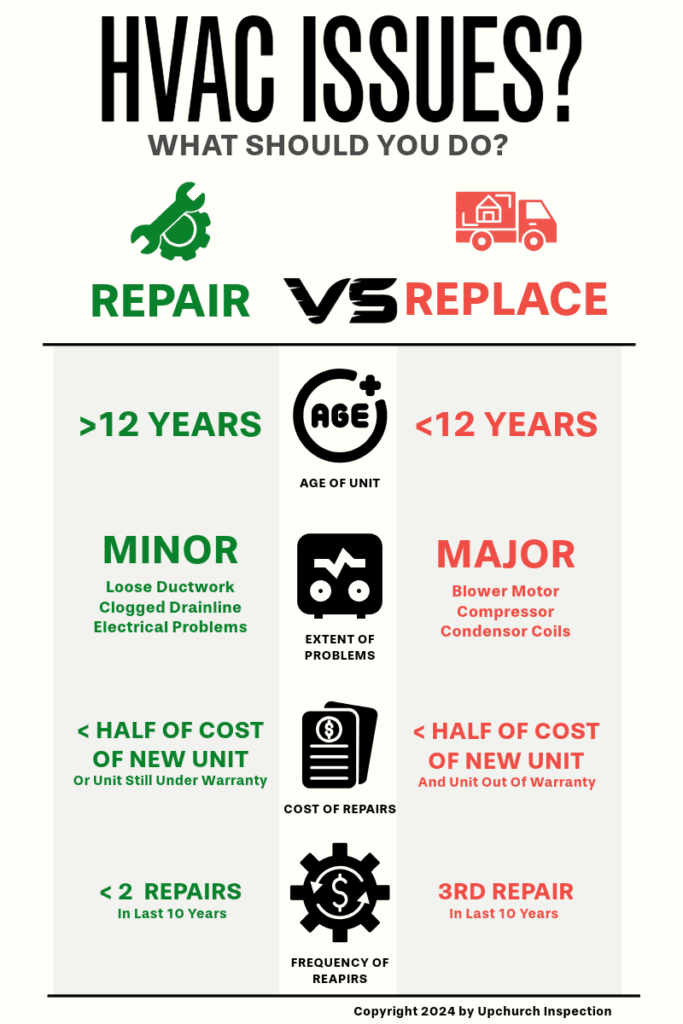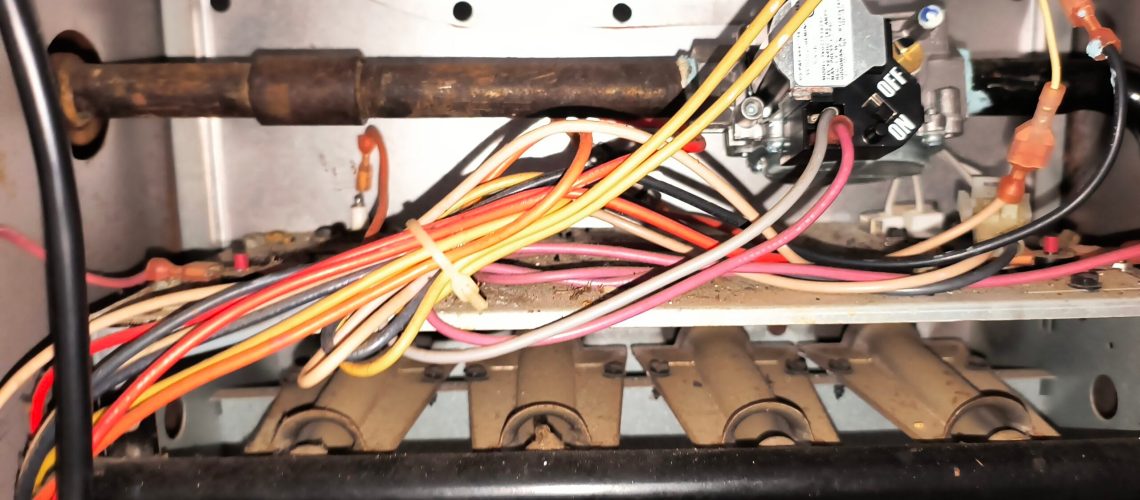Creating a cozy and welcoming home largely depends on the efficiency of your HVAC (Heating, Ventilation, and Air Conditioning) system. This essential system works tirelessly to keep your space warm during chilly winters and cool during sweltering summers. It ensures that the air you breathe is clean and healthy all year round. However, like any equipment, HVAC systems have a finite lifespan. Understanding the age of your HVAC system is key to determining when it might need repairs, upgrades, or even a complete replacement.
At Upchurch Inspection, we’ve proudly assisted countless homeowners in Memphis to evaluate the condition of their HVAC systems. Let’s dive into the factors that influence the age of your HVAC system and how it can make a real difference in your home environment!
How Long Do HVAC Systems Last?
Typically, an HVAC system will serve you well for about 10 to 15 years. However, this can vary depending on several factors.
- Type of System: For instance, central air conditioners generally last between 10 and 15 years, while furnaces often have a slightly longer lifespan, typically lasting around 15 to 20 years.
- Maintenance: Regular maintenance is the cornerstone of extending your HVAC system’s life. Systems that are routinely cleaned, inspected, and serviced tend to last significantly longer compared to those that are neglected.
- Usage: Homes that are occupied year-round, especially in extreme weather conditions, tend to put more strain on their HVAC systems. Consequently, the more frequently a system operates, the quicker it may wear out.
- Quality of Installation: A well-installed system will run more efficiently and have a longer operational life. On the other hand, a poor installation can lead to premature failures and more frequent repairs.
How to Determine the Age of Your HVAC System
Worried about not knowing the age of your HVAC system? No need to stress! There are straightforward ways to find out. One easy method is to examine the model number on your unit. Manufacturers commonly encode the manufacturing date within the serial number. You can pinpoint its age by reaching out to the manufacturer or checking the system’s manual.
If you can’t find the serial number or feel unsure about interpreting it, a professional home inspector or an HVAC technician will gladly help you figure this out!
Signs That Your HVAC System is Getting Older
As your system ages, there may be some telltale signs that it isn’t performing quite like it used to. Here are some common indicators to watch for:
- Increased Energy Bills: As your HVAC system grows older, you might notice rising energy costs. An aging unit may struggle to maintain the desired temperature efficiently, leading to higher utility bills.
- Frequent Repairs: If you call for repairs all too often, it’s a sign that your HVAC system might be nearing the end of its road. While some repairs are standard, a breakdown spike may suggest that significant components are starting to fail.
- Inconsistent Temperatures: If your HVAC system has difficulty heating or cooling your home evenly, it could indicate airflow issues or declining efficiency.
- Strange Noises: Any unusual sounds, like rattling, grinding, or banging, may signal that your system struggles with worn-out parts that need attention.
By watching for these signs, you’ll be better equipped to decide whether it’s time for some maintenance or even a new system!
Should You Replace Your HVAC System?
As time passes and your HVAC system ages, it may become increasingly vulnerable to breakdowns, making the replacement idea worth considering. Here are several factors to help you decide if it’s time for a new HVAC system:
- Age of the System: If your HVAC system is over 10 years old and frequently needs repairs, now may be the time to explore replacement. Systems approaching 15 years of age often lose efficiency and may become more costly.
- Rising Repair Costs: If repair costs amount to 50% or more of the cost of a replacement system, opting for a new unit is often the more financially savvy choice.
- Energy Efficiency: Older HVAC systems usually lack the energy efficiency of today’s models. Upgrading to a modern, energy-efficient system can significantly save your monthly energy bills.
- Frequent Breakdowns: If your system seems to spend more time being repaired than functioning correctly, it’s likely time for a change. Constant repairs not only inconvenience you but can drain your wallet over time.
See our article on preventing unexpected breakdowns for maintenance tips.

The Benefits of Replacing an Old HVAC System
Deciding to replace your HVAC system can lead to a multitude of advantages:
- Improved Energy Efficiency: New HVAC systems are designed with cutting-edge technology, making them significantly more energy-efficient than their older counterparts. Upgrading can reduce your energy bills by 20-40%.
- Enhanced Comfort: Modern systems ensure consistent and reliable comfort throughout your home. No matter the season, a new HVAC system will more effectively keep your home at your desired temperature.
- Fewer Repairs: Typically, a new system requires fewer repairs in its initial years, saving you time and money. Plus, it has warranties that provide peace of mind regarding potential issues.
By staying informed and proactive about your HVAC system, you’re making an excellent investment in the comfort and quality of your home for yourself and your loved ones. Taking the time to assess your situation empowers you to make decisions that will create a happier, more enjoyable living space!
- Environmental Impact: It’s exciting to know that newer HVAC systems utilize eco-friendly refrigerants and cutting-edge technologies designed to lessen your impact on the environment. Every small step counts in reducing your carbon footprint!
- The Importance of Regular Inspections: Regular inspections are vital for keeping your HVAC system running smoothly, even if it’s not nearing the end of its lifespan. A trusted home inspection company, like Upchurch Inspection, can thoroughly evaluate your system’s condition, efficiency, and age, helping you identify any potential issues early on.
During the inspection, we’ll ensure your system performs at its best and provide tailored recommendations for maintenance, repairs, or even replacement if necessary. By being proactive, you can avoid costly emergency repairs while maximizing efficiency.
If your HVAC system is starting to show its age or any signs of trouble, don’t hesitate! Reach out to a professional to assess your system and take the initiative to maintain a comfortable home throughout the year. Your cozy haven deserves it!


